Gannett Faces Walkout, Claim of White Victimhood
First Trans Candidate to Run for NABJ President
‘PBS NewsHour’ Aiming to Elevate the ‘Overlooked’
‘Get Down, Get Down . . . Thank You, Lord Jesus’
Let’s Hear More About the Cooper Andrewses
‘Amputation Epidemic in the Black Community’
Homepage photo: USA Today newsroom
Support Journal-ismsDonations are tax-deductible.
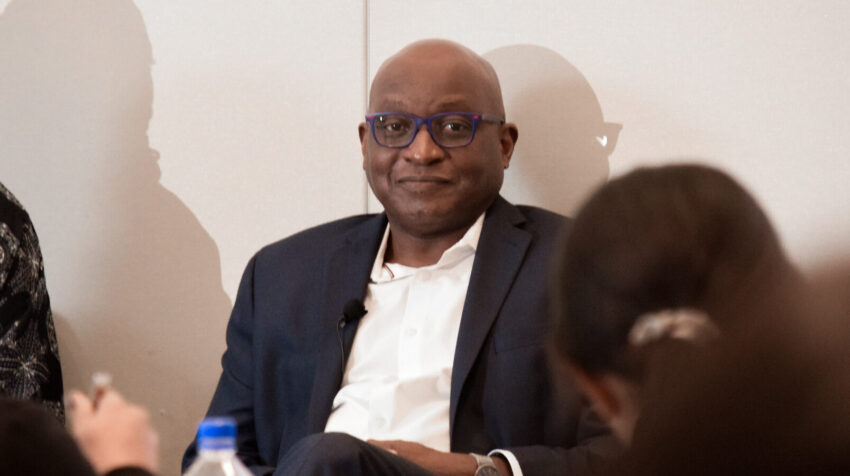
Gannett Faces Walkout, Claim of White Victimhood
Terence Samuel, a veteran journalist whose career includes being No. 2 at TheRoot.com, writing a book about the U.S. Senate and his current job as vice president and executive editor of NPR News, Friday was named editor-in-chief of USA Today.
The Trinidad-born Samuel starts July 10, and will be the first Black person to have the job on a permanent basis. (Michael McCarter holds the position now on as interim editor).
“Samuel will oversee the flagship national publication and guide the next phase of growth and innovation at USA TODAY,” an announcement said. “In his role, Samuel will shape content that serves over 75 million readers monthly who trust USA TODAY as a clear, concise and facts-based news source.”
The appointment comes amid low morale at the national newspaper and throughout the Gannett newspapers, which comprise the nation’s largest news operation.
“Journalists for the largest newspaper chain in the country will walk off the job next week, in a series of strikes staged in part to protest the leadership of the company’s chief executive,” Elahe Izadi reported Thursday for The Washington Post.
“Hundreds of staffers for 24 Gannett newspapers, including the Arizona Republic, Austin American-Statesman and the Palm Beach Post, say they will not report to work for a day or two starting Monday, forfeiting pay and forgoing assignments ranging from city council meetings to high school sports championship games. At some papers, the strikes begin Tuesday. . . .”
Moreover, a white former editor and content strategist at the Democrat and Chronicle in Rochester, N.Y., is suing Gannett Co. Inc., and its newspapers in Rochester and Utica, N.Y., claiming he is the victim of race-based discrimination.
In 2020, Gannett, the owner of USA Today and more than 260 local news operations, announced a broad initiative “to make its workforce as diverse as the country by 2025 and to expand the number of journalists focused on covering issues related to race and identity, social justice and equality,” Nathan Bomey reported at the time for USA Today.
When the most recent USA Today editor, Nicole Carroll, stepped down effective May 1, the newspaper wrote that “Carroll, who is also Gannett’s President of News, championed greater diversity, equity and inclusion at USA TODAY. Under her leadership, USA TODAY hired more journalists of color and in 2020 announced plans to add or reassign journalists to 20 new beats to expand coverage of inequities in the U.S.”
Gannett Chief Content Officer Kristin Roberts said in a statement, “Terry will accelerate our transformation of USA TODAY, embracing our role and our roots as America’s newspaper with the core mission of being nothing less than essential to the readers, viewers and listeners we serve nationwide. With his reputation of leading award-winning newsrooms and fostering cultural change, Terry will be instrumental in the next phase of growth at USA TODAY.”
However, David Folkenflik wrote for NPR, “Samuel, currently NPR’s vice president of newsgathering and executive editor, will inherit a once-proud news title devastated by cuts. USA Today’s parent company, Gannett, has cut 54 percent of its staff over the past four years, according to Jon Schleuss, president of the News Guild, which represents hundreds of journalists throughout the company, though not at USA Today.
“Samuel will depart a national broadcast network with vast reach and its own financial strains: NPR recently underwent serious cutbacks that included a 10-percent reduction in staff due to a collapse of podcast sponsorships.”
Folkenflik also wrote, “Samuel is known within NPR as an affable figure who operates with confidence born of decades of Washington experience.
“In a brief interview, Samuel said he arrived at NPR the day before then President Donald Trump fired FBI Director Jim Comey.
” ‘It’s been the craziest of times from the beginning until the very end,’ Samuel said of his NPR experience. ‘This is a far more collaborative newsroom than the one I walked into. I particularly love that we are faster, broader and deeper than we were — both digitally and on the air.’ “

The lawsuit against Gannett was filed in Rochester in April by Steven Bradley, who worked for the D&C for 21 years beginning in 1999, as Will Astor wrote April 24 in the Rochester Beacon.
Seeking class-action status, the suit alleges that “Gannett moved forward with the implementation of the Reverse Race Discrimination Policy resulting in numerous highly qualified non-minority employees finding their employment terminated or suffering other adverse employment actions based purely on their race.”
“There can be no question that Mr. Bradley’s termination was directly based on his race.”
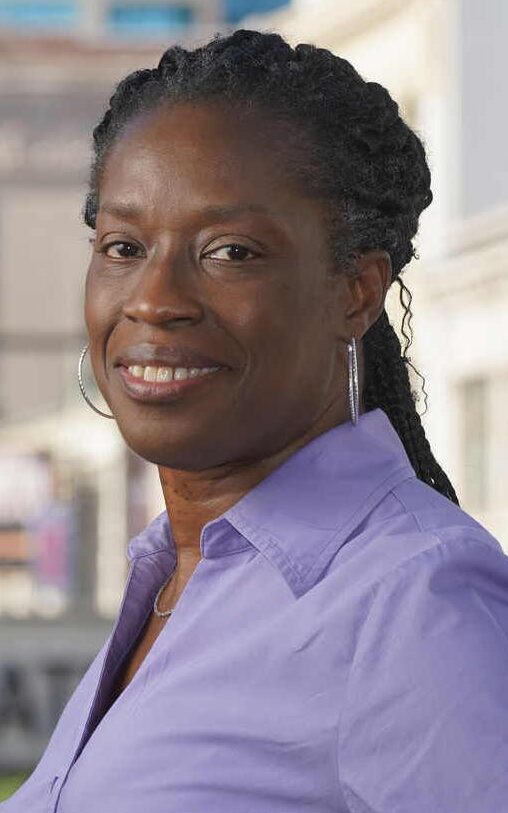 The suit also negatively names Black journalists Sheila Rayam (pictured), now editor of the Buffalo News, and Hollis R. Towns, who stepped down as Gannett vice president for local news last month.
The suit also negatively names Black journalists Sheila Rayam (pictured), now editor of the Buffalo News, and Hollis R. Towns, who stepped down as Gannett vice president for local news last month.
At the Gannett-owned Times-Dispatch in Utica, N.Y., “Ms. Rayam, a Black female, was selected for the [editor’s] position despite not having expressed interest or applying in the first instance, and despite having far less qualifications than Mr. Bradley, including no prior newsroom management experience, having only previously worked as a reporter and community engagement editor,” the suit says.
It also says that “the Gannett employee tasked with overseeing talent recruitment and retention, Hollis Towns, informed Gannett managers that no more straight White males should be hired going forward.”
Rayam did not respond to a request for comment, and Mike Kilian, the Democrat and Chronicle editor, also named in the lawsuit, referred comment to a Gannett spokesperson. The spokesperson said, “We do not comment on pending litigation.”
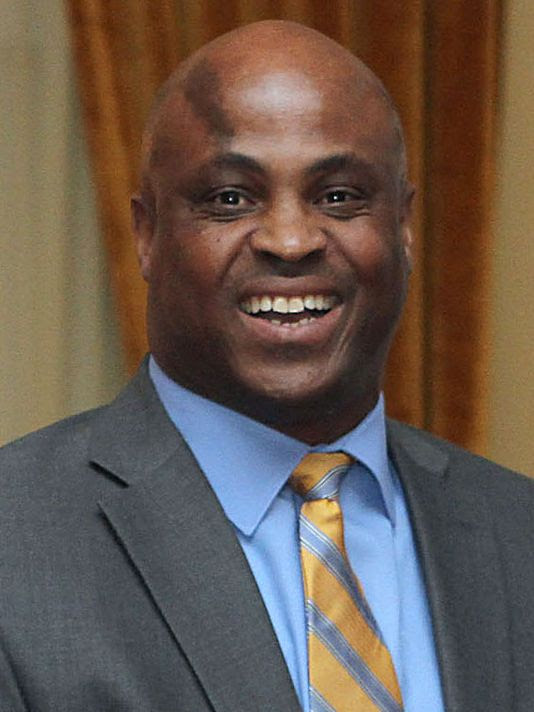 However, Towns (pictured) said that at the time, he was not in the role Bradley claimed, that the statements attributed to him are untrue and that he is exploring legal action. Neither Bradley nor his lawyers responded to a question asking how they could verify that Towns actually said what was alleged.
However, Towns (pictured) said that at the time, he was not in the role Bradley claimed, that the statements attributed to him are untrue and that he is exploring legal action. Neither Bradley nor his lawyers responded to a question asking how they could verify that Towns actually said what was alleged.
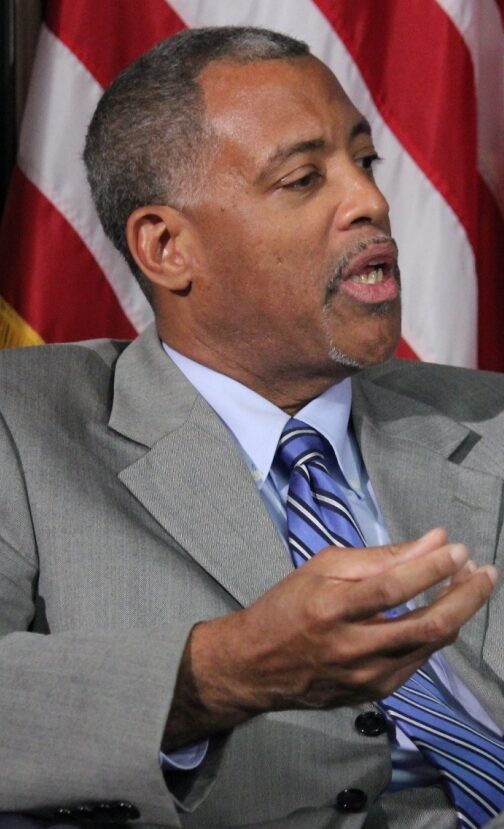 Mizell Stewart III (pictured) retired as Gannett vice president for news performance, talent & partnerships in October. He now leads his own leadership development and consulting firm, Emerging Leaders LLC, which works with for-profit and nonprofit newsrooms in the U.S. and Canada.
Mizell Stewart III (pictured) retired as Gannett vice president for news performance, talent & partnerships in October. He now leads his own leadership development and consulting firm, Emerging Leaders LLC, which works with for-profit and nonprofit newsrooms in the U.S. and Canada.
“I’m quite proud of the work we did at Gannett to improve newsroom diversity, particularly at the leadership level, and to measure and publicly report our progress to better reflect the communities we serve,’ Stewart, a Black journalist, told Journal-isms. “It is my hope that this lawsuit does not have a chilling effect on these efforts at my former company and in the news industry at large.
“The upward trajectory of Sheila Rayam’s career since her first promotion to top newsroom editor – not to mention other newsroom leaders of color who have enjoyed similar success with Gannett and beyond – is a testament to her leadership abilities and journalistic talent. At the end of the day, those are the qualities that count.”
First Trans Candidate to Run for NABJ President
Tre’vell Anderson, who identifies as “a Black trans (nonbinary) person,” has become the first such official presidential candidate in the 47-year-history of the National Association of Black Journalists. Anderson and Ken Lemon, the current vice president/broadcast, have been certified and were permitted to begin campaigning Friday.
Roland Martin, the entrepreneurial journalist and former NABJ board member who had said he was considering a run for the job, decided against it, he told Journal-isms. “My time is focused on growing and expanding Black Star Network,” Martin messaged.
Electronic voting takes place July 10 to Aug. 4.
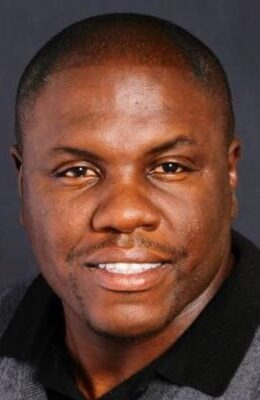 Lemon (pictured) reporter for WSOC-TV, Charlotte, N.C., is deputy chairman of the NABJ Broadcast Task Force, chairman of the NABJ Black Male Media Project and former Region III director and deputy director.
Lemon (pictured) reporter for WSOC-TV, Charlotte, N.C., is deputy chairman of the NABJ Broadcast Task Force, chairman of the NABJ Black Male Media Project and former Region III director and deputy director.
“I have experience working with NABJ on a local, regional and national level and a history of working with and fighting for journalists,” Lemon said in his official statement. “I will bring those principles to my work for you as NABJ President. That includes long-term plans to produce more Black news leaders, strengthen finances to better serve members, connect with local chapters, and bring more access to your Board of Directors.
“My plans work best when they include active input and engagement from members. That builds inclusion and creates continuity.”
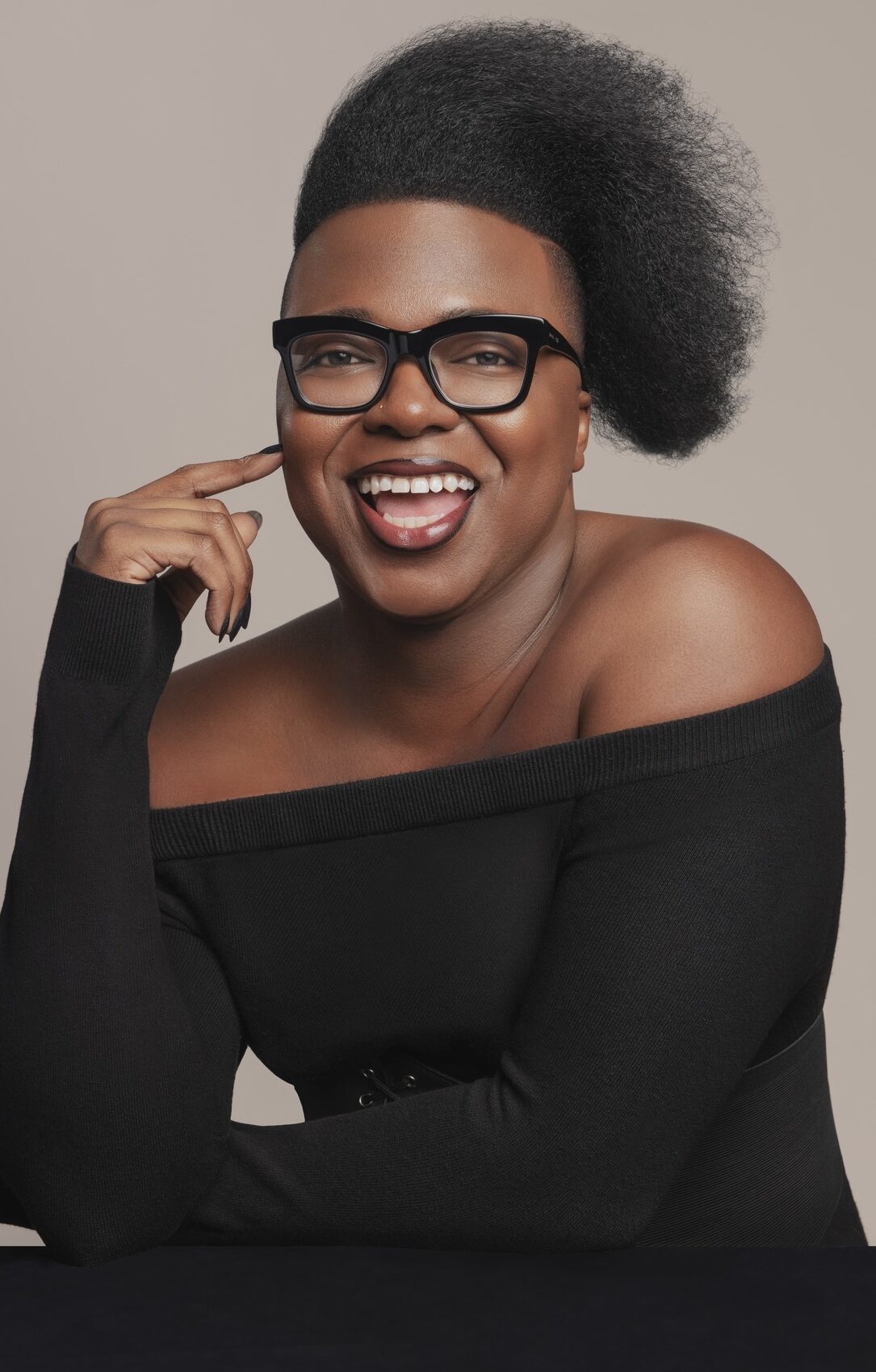 Anderson (pictured), the current Region IV director, has been co-chair of NABJ’s LGBTQ+ Task Force since 2017 and led planning of the organization’s first-ever Arts & Entertainment Media Institute this year. They, the pronoun Anderson uses, have been a board member and immediate past president of the NABJ Los Angeles chapter. Anderson is an “independent journalist and authoress who hosts two podcasts,” and says they were last formally in a newsroom in 2019. “It’s much more common in my experience that trans people, especially Black trans people, are freelancers and contributors, and that’s across mainstream and niche media,” they told Journal-isms in March.
Anderson (pictured), the current Region IV director, has been co-chair of NABJ’s LGBTQ+ Task Force since 2017 and led planning of the organization’s first-ever Arts & Entertainment Media Institute this year. They, the pronoun Anderson uses, have been a board member and immediate past president of the NABJ Los Angeles chapter. Anderson is an “independent journalist and authoress who hosts two podcasts,” and says they were last formally in a newsroom in 2019. “It’s much more common in my experience that trans people, especially Black trans people, are freelancers and contributors, and that’s across mainstream and niche media,” they told Journal-isms in March.
Anderson’s official statement says, “As NABJ approaches its 50th anniversary, it’s important to ensure we’ll continue to be impactful and relevant for the next half-century.
“But that can’t happen if our organization is not meeting this moment in our industry in the best ways possible, and if we don’t lead with an eye toward embracing said future. As an independent journalist that works across print, digital, and broadcast — in news and entertainment — I am a reflection of the realities of journalism today, and tomorrow. As NABJ President, I’d help chart an informed path forward that emboldens our members to have the careers they desire.”
These candidates are unopposed: Walter Smith Randolph, vice president/broadcast; Madison Carter, secretary and Eva D. Coleman, Region III director. Vance Lang and Amir Vera are vying for vice president/digital.
Candidates for student representative are Anthony Council of the University of North Texas; Grant Hines of High Point University and Alex Perry of Northwestern University.
“We’re grateful to have a hand in widening the aperture,” said co-anchor Geoff Bennett. (Video: PBS/YouTube)
‘PBS NewsHour’ Aiming to Elevate the ‘Overlooked’
If there was doubt that there are new priorities at the “PBS NewsHour,” now co-hosted by Geoff Bennett, a Black journalist, and Amna Nawaz, who is Pakistani-American, Wednesday’s show should remove it. The new co-anchors took over in January.
Among Wednesday’s stories was one on Uganda LGBTQ+ leader Steven Kabuye, who fears for his life after his country enacted one of the world’s harshest anti-LGBTQ+ laws. He said a gang came looking for him, and when they couldn’t find him, beat Kabuye’s colleague so badly he almost lost his life. The “NewsHour” showed the colleague in the hospital.
Another focused on police violence against Asian Americans. Data “show that, as a whole, they experience low rates of fatal police violence. But new research shows the risks they face are much higher.“
A third was about Sixto Cancel, a Black man who grew up painfully in foster care and founded an organization, Think of Us, to help ensure that his experience wouldn’t be repeated with others. “I was 11 months old when social workers placed me into foster care because of my mother’s drug addiction and poverty issues. I was adopted at 9. And that adoptive family was supposed to be my forever family. But, unfortunately, it was riddled with racism and extreme abuse,” Cancel said.
 “I have actually could have been raised with family if we would have had prioritized family members . . . .”
“I have actually could have been raised with family if we would have had prioritized family members . . . .”
New priorities for the show? Bennett (pictured) messaged Journal-isms, “At the heart of public media is a mandate to reflect the country we serve. We take that seriously and have been intentional about elevating life experiences and voices that are often overlooked. It’s part of the NewsHour legacy, and we’re grateful to have a hand in widening the aperture and sharing a broad array of stories and conversations.”
The spray of bullets very close by stopped the reporter, her crew and the woman being interviewed and they dove out of camera range. (Credit: YouTube)
‘Get Down, Get Down . . . Thank You, Lord Jesus’
“A reporter with ABC station WATN in Memphis, Tennessee, was interviewing a local woman about the rise in crime when a drive-by shooting erupted in their vicinity and they dove for cover,” Rosemary Rossi reported Saturday for The Wrap.
“ ‘We report about the city’s crime problem almost every day, but today that problem hit home for one of our crews while doing a story about crime in Whitehaven,’ WATN anchor Richard Ransom said. ‘We were interviewing a woman about the Memphis PD’s plan to enforce the city’s teen curfew when out of nowhere [there was] a drive-by shooting across the street.’
“Yolanda Cooper Sutton was spelling her name for the on-the-scene reporter, Jay Jones, when the spray of bullets very close by stopped them in their tracks and they dove out of camera range.
“ ‘Get down, get down, get down, just stay down and get down,’ she told Jones calmly. ‘That’s OK. Thank you, Lord Jesus. Stay down and get down.’ . . .”
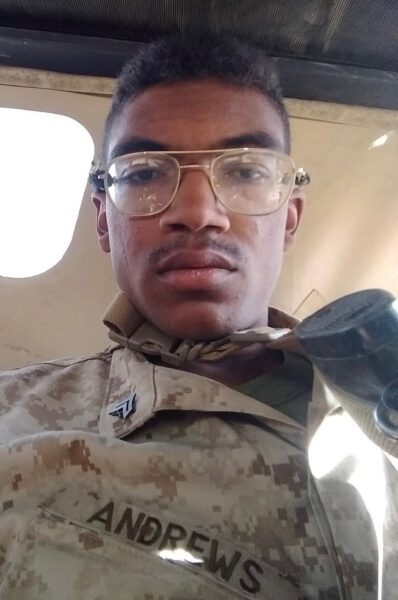
Let’s Hear More About the Cooper Andrewses
Sometimes stories make the reader go “Wait a minute!,” and the tale of Cooper Andrews is one.
Andrews’ story was part of a larger Memorial Day package in The Washington Post. Andrews, 26, of Cleveland Heights, Ohio, was a former U.S. Marine who volunteered to go to Ukraine and was killed there on April 19. He was an African American who was passionate about social justice and inspired to go to Ukraine partly by the 2014 police killing of 12-year-old Tamir Rice in Cleveland, his mother, Willow Andrews, said.
“In November of 2022, Cooper joined the Foreign Legion and left for Ukraine,” Willow Andrews says on the GoFundMe page she created. “Before he departed we had conversations about Spain and fascism and history, and he made it clear to me that he was going because of the humanitarian needs of the people there. He was so disturbed by what was happening, and for him, it wasn’t just about war in the abstract as it is often represented in the media – we bombed this or that, drone strikes and weapons donations – but about the lives of everyday people struggling against a fascist regime. . . .”
Are there more like Andrews? Terrell Jermaine Starr, the only Black correspondent who has been in Ukraine and Eastern Europe for the long haul, messaged Journal-isms, “I’m working on a story about black Americans who go to Ukraine to work and fight.” He told the Journal-isms Roundtable last year, “the fewer Black journalists in this part of the world, the fewer options for us to really understand what’s happening.
“I believe that Black people have a better understanding of Russia’s invasion of Ukraine than anybody who isn’t Ukrainian or from that part of the world. I think that because of our own experiences in dealing with white supremacy in this part of the world, I think we can provide unique context with the Russian supremacy that’s going on against Ukraine.”
In Ukraine, the Kyiv Post reported May 1, “In Cooper’s messages to his friends, the volunteer wrote that [Russian Premier Vladimir] Putin’s regime must disappear, and he wanted Kharkiv to survive.’
“On February 27, 2022, Volodymyr Zelenskyy appealed to foreigners who want to ‘join the defense of security in Europe and the world’ to join the ranks of the International Legion. According to official figures, citizens of 55 countries serve in the Legion. The British, Americans, Poles, and Canadians have shown the greatest solidarity with Ukraine.
“Since February 24, more than 100 foreign volunteers who fought for Ukraine have been killed in combat. The following countries have suffered the greatest losses: Georgia, Belarus, the US, Azerbaijan, and Great Britain.
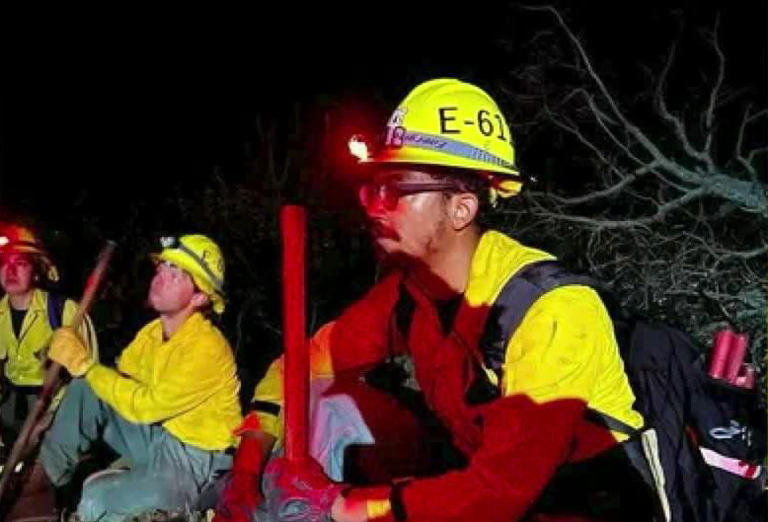 “Also, soldiers from Australia, Brazil, Canada, Colombia, France, Israel, Italy, the Netherlands, Poland, Argentina, Germany, Denmark, Ireland, Japan, Spain, New Zealand, Ichkeria, Taiwan, Croatia, the Czech Republic, Sweden, and Taiwan have been killed defending Ukraine. . . .” (Photo of Andrews from WOIO)
“Also, soldiers from Australia, Brazil, Canada, Colombia, France, Israel, Italy, the Netherlands, Poland, Argentina, Germany, Denmark, Ireland, Japan, Spain, New Zealand, Ichkeria, Taiwan, Croatia, the Czech Republic, Sweden, and Taiwan have been killed defending Ukraine. . . .” (Photo of Andrews from WOIO)
Andrews’ story was reported by some national networks and by local outlets, but was notably absent from the traditional Black press, particularly the Don King-owned Cleveland Call and Post.
The May 29 Washington Post account, from the larger story by Alex Horton and Dan Lamothe, reads:
“Andrews, 26, had been in Ukraine for months, having gravitated toward the opportunity to fight fascism, said his mother, Willow Andrews. He knew it was dangerous, she said, but he was eager to help evacuate those in danger.
“He kind of had the attitude, ‘If I don’t do it, who’s going to do it?’” his mother recalled.
“Andrews, who grew up outside Cleveland, was passionate about social justice and inspired by the 2014 police killing of 12-year-old Tamir Rice, his mother said. Since Andrews’s death, his family has raised more than $20,000 in his name to assist charities focused on food insecurity and community organizing.
“Andrews, who was Black and had become an Eagle Scout as a teenager, liked the structure of the Marine Corps, his mother said, though he was disturbed by the racism he encountered in the ranks. In one case, he was called a ‘Black nationalist’ by White colleagues who confronted him for reading a book about Malcolm X, Willow Andrews said.
“ ‘They just couldn’t grasp the idea that he could want all kinds of knowledge and still just be a person,’ she said.
“His experiences were better in his Ukrainian unit, his mother said. ‘We are brothers, Mom,’ she recalled him saying.
“The family held a memorial service for Cooper on May 20 at Forest Hill Presbyterian Church in his hometown of Cleveland Heights.
“When his remains return to the United States, Cooper will be buried alongside his father in Cleveland, his mother said. She has sought help from the Ukrainian community in Ohio after losing faith that the State Department will get the job done, she said. Communication with the U.S. government, she said, has been frustrating, inconsistent and at times exasperating. She has relied, in part, on updates from European families with connections to her son’s unit.
“A State Department official, speaking on the condition of anonymity under ground rules set by the agency, defended the administration’s efforts in this case and others, saying the U.S. government ‘takes its role in such a situation very seriously’ and shares information with families ‘whenever possible.’ ”
‘Amputation Epidemic in the Black Community’
“The 5th Edition of ‘AMERICA IN BLACK’ will air Sunday, June 4 at 10 PM ET/PT on BET, BET Her and available on BET+ and The CBS News Streaming Network,” BET announces.
“This installment will feature an eye-opening investigation on the amputation epidemic in the Black community reported by Pulitzer Prizewinning journalist Wesley Lowery; an empowering profile of actor, producer, and best-selling author Gabrielle Union star of the upcoming BET+ original docuseries ‘Gabrielle Union: My Journey to 50’ and a profile of celebrated historian, professor, and filmmaker Henry Louis “Skip” Gates Jr.
“I wanted to call out the heart-wrenching investigative piece on unnecessary amputations with correspondent Wesley Lowery as the anchor. Please see an exclusive clip of the segment here.“
To subscribe at no cost, please send an email to journal-isms+subscribe@groups.io and say who you are.
Facebook users: “Like” “Richard Prince’s Journal-isms” on Facebook.
Follow Richard Prince on Twitter @princeeditor
Richard Prince’s Journal-isms originates from Washington. It began in print before most of us knew what the internet was, and it would like to be referred to as a “column.” Any views expressed in the column are those of the person or organization quoted and not those of any other entity. Send tips, comments and concerns to Richard Prince at journal-isms+owner@
View previous columns (after Feb. 13, 2016).
View previous columns (before Feb. 13, 2016)
- Diversity’s Greatest Hits, 2018 (Jan. 4, 2019)
- Book Notes: Is Taking a Knee Really All That? (Dec. 20, 2018)
- Book Notes: Challenging ’45’ and Proudly Telling the Story (Dec. 18, 2018)
- Book Notes: Get Down With the Legends! (Dec. 11, 2018)
- Journalist Richard Prince w/Joe Madison (Sirius XM, April 18, 2018) (podcast)
- Richard Prince (journalist) (Wikipedia entry)
- February 2018 Podcast: Richard “Dick” Prince on the need for newsroom diversity (Gabriel Greschler, Student Press Law Center, Feb. 26, 2018)
- Diversity’s Greatest Hits, 2017 — Where Will They Take Us in the Year Ahead?
- Book Notes: Best Sellers, Uncovered Treasures, Overlooked History (Dec. 19, 2017)
- An advocate for diversity in the media is still pressing for representation, (Courtland Milloy, Washington Post, Nov. 28, 2017)
- Morgan Global Journalism Review: Journal-isms Journeys On (Aug. 31, 2017)
- Diversity’s Greatest Hits, 2016
- Book Notes: 16 Writers Dish About ‘Chelle,’ the First Lady
- Book Notes: From Coretta to Barack, and in Search of the Godfather
- Journal-isms’ Richard Prince Wants Your Ideas (FishbowlDC, Feb. 26, 2016)
- “JOURNAL-ISMS” IS LATEST TO BEAR BRUNT OF INDUSTRY’S ECONOMIC WOES (Feb. 19, 2016)
- Richard Prince with Charlayne Hunter-Gault, “PBS NewsHour,” “What stagnant diversity means for America’s newsrooms” (Dec. 15, 2015)
- Book Notes: Journalists Follow Their Passions
- Book Notes: Journalists Who Rocked Their World
- Book Notes: Hands Up! Read This!
- Book Notes: New Cosby Bio Looks Like a Best-Seller
- Journo-diversity advocate turns attention to Ezra Klein project (Erik Wemple, Washington Post, March 5, 2014)

